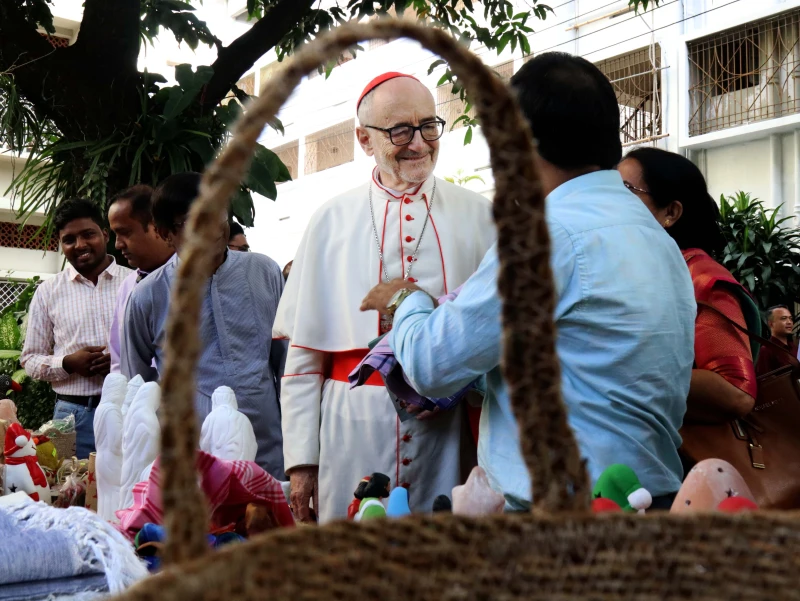
Cardinal Michael Felix Czerny, SJ, head of the Dicastery for Promoting Integral Human Development, visits a stall of Caritas Bangladesh on Nov. 4, 2025, in Dhaka. / Credit: Stephan Uttom Rozario
Dhaka, Bangladesh, Nov 6, 2025 / 11:45 am (CNA).
Indigenous Catholic leaders in Bangladesh called for stronger Church support to protect their rights, land, and culture in the Muslim-majority South Asian nation during the 50th anniversary celebration of the Episcopal Commission for Justice and Peace (EC-JP) of the Catholic Bishops’ Conference of Bangladesh.
Cardinal Michael Czerny, SJ, head of the Dicastery for Promoting Integral Human Development, inaugurated the celebration Nov. 4 under the theme “Raising Hope to Foster a Culture of Care.”
Christians make up less than 1% of Bangladesh’s population of approximately 170 million people. Indigenous Christians, who comprise more than 50% of the country’s 400,000 Catholics, face particular challenges regarding land rights and cultural preservation.
Indigenous leaders said they have long been successful stewards of the country’s biodiversity. However, Indigenous peoples’ land, territories, and way of life are threatened by extractive industries, tourism, industrial agriculture, and development projects.
“Proper and meaningful recognition of Indigenous peoples’ rights is a big challenge here in Bangladesh,” said Sanjeeb Drong, a Garo Indigenous Catholic leader. “Major challenges include human rights violations, land grabbing and exploitation, lack of access to justice, displacement, poverty and unemployment, loss of culture and language, and exclusion from decision-making that affects their lives and future.”

Drong called for the Church’s help and a strong position to uphold Indigenous rights in Bangladesh. “Indigenous youth and women leaders need support to promote their advocacy capacity. Let’s respect the cultures, dignity, and rights of Indigenous peoples on this land and take necessary steps to support them.”
He recalled Pope Francis’ work for Indigenous people. Laudato Si’ calls for dialogue between the Church and Indigenous peoples, recognizing them as crucial allies in the struggle for justice and environmental protection. Drong emphasized the need to implement the U.N. Declaration on the Rights of Indigenous Peoples at the country level.
The EC-JP is an official commission of the Catholic Bishops’ Conference of Bangladesh. On Feb. 2–4, 1972, at their first meeting in independent Bangladesh, the bishops took the initiative to establish the Justice and Peace Commission by prioritizing human rights and justice activities in association with the global Church.
The commission works for the protection of human rights, child protection and safeguarding, climate adaptation and mitigation, protection of migrants and internally displaced people, and pastoral support to prisoners, said Holy Cross Father Hubert Litom Gomes, secretary of EC-JP.
“We have some limitations in Bangladesh, as minorities, religion, migration, and labor rights are sensitive issues,” Gomes said.
Even with moral support, the actual implementation of development projects requires funding, local capacity, and bureaucratic cooperation.
However, Gomes expressed hope that Czerny’s visit could provide immediate visibility and inspiration. “We hope that we can do better with the help of the Dicastery for Promoting Integral Human Development,” he added.
Benedict Alo D’Rozario, president of Caritas Bangladesh, who was involved with the EC-JP from the beginning, said the commission has conducted important studies on tea workers and brickyard workers, which have had significant impacts on their lives.
“I think Christian religious and other minorities — unless we are organized, unless we raise our voice — our demands and issues will not be met,” D’Rozario said. “So we need to rethink our strategy for how we face these realities: the issues of injustice, issues of discrimination, issues of negligence.”
“As you consider the mission of the promotion of justice, I want to emphasize that no one can develop someone else,” Czerny said. “Parents help their children develop; they do not develop them. The Church promotes integral human development, but the people themselves are the primary agents of their own development.”
The cardinal added: “Our role is to accompany them pastorally in overcoming the obstacles to their development. We hope in their struggles they will say, ‘The Church is with us, Jesus is always with us.’”















